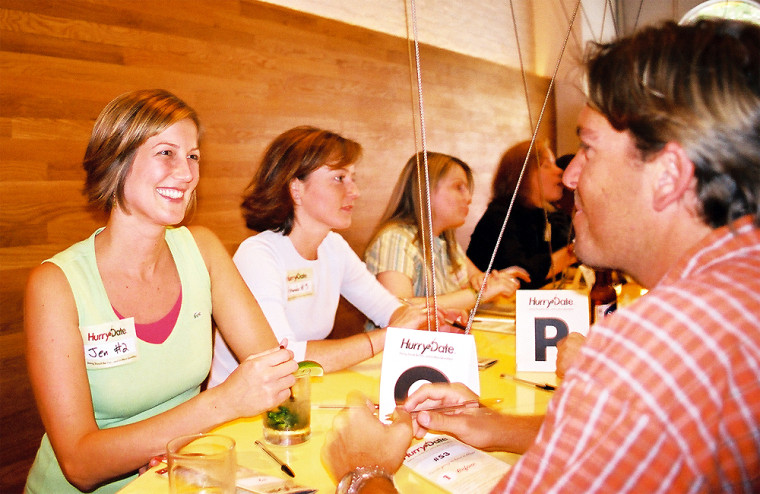Boy meets girl. Boy likes girl. Boy and girl have coffee together. Girl evaluates boy's interpersonal style. Girl tells boy what he did and did not do right. Boy never sees girl again. Whole thing costs boy $195.
Sound like a bad date? Not exactly.
In the cutthroat world of New York dating, it's one of the many ways singles look for an edge. This service, a simulated "date," is offered by First Impressions Consulting; one of many quirky methods available nowadays to meet a mate.
It's no wonder as the number of single American adults — around 86 million, according to the American Association of Single People — is believed to be at an all-time high.
And they are going to ever-greater lengths to meet their match.
Cloak-and-dagger
The process at First Impressions is simple, but has an almost cloak-and-dagger feel to it.
Clients are told they will meet their “date” at a stylish cafe in New York’s Soho area. The date will be sitting alone, reading a copy of The New York Times. If you are a boy, you are told your date's name is Susan Green. You are told she is single and lives in the area. She likes film, travel and painting. You are to assume that she's roughly your age and that you find her attractive. As the client, the onus is on you to approach her, introduce yourself and pick up the tab at the cafe.
Afterward, your date — actually a First Impressions consultant with an advanced degree in psychology — reveals her real name, describes what kind of impression was made and makes suggestions for improvements.
Of course, the immediate reaction of some people when told they, for example, don't give out enough personal information, or they don't make enough eye contact, is: what gives you the right …?
“It’s not just ‘think from your gut,’” said Dr. Ann Demarais, who along with First Impressions co-founder Dr. Valerie White has come out with a new book, “First Impressions: What You Don't Know About How Others See You.”
“We’ve researched carefully what behaviors are more widely appealing to others,” Demarais said. “I could say, ‘Look, you might be quirky and off from the norm, and I like that,’ and so I give you a positive rating. But that wouldn't be as valuable than to say, for example, that this [behavior] is more universally appealing and you're not doing that all the time — are you aware of that? Is that the image you want to project?”
A rising industry
There are plenty of other quirky matchmaking services.
In New York, there's Dinner in the Dark, which arranges meals in a pitch-black bar and restaurant. Waiters equipped with night goggles are the only ones who can see — leaving clients to fumble with their utensil-free dinner while getting to know their prospective matches, from the inside out. Candles are lit during dessert, when clients see who is sitting next to them.
In San Francisco, there's Table for Six, which sets groups of singles up for dinner at upscale restaurants. After the meal, organizers make follow-up matchmaking phone calls for interested clients.
No time to waste? Try speed dating.
For singles tired of trying to make eye contact with a potential beau in a crowded bar, speed dating gathers together people who are all out to meet a match.
“I guarantee you that unless you're Superman, you won't meet 25 people at a bar on any given night,” said Ken Deckinger, CEO of HurryDate. “Even if you did meet five to 10 people, they won't necessarily be interested and single.”

The HurryDate format is simple. Twenty-five men and 25 women gather at a bar. Every three minutes, a whistle is blown, the men get up, switch tables and meet someone new. Everyone is then rated on a card — a “yes” or “no” — and if two “yeses” match up, the two are put in touch with each other.
Participants aren’t going to come away with a marriage proposal, but that isn’t the point, Deckinger said.
“In three minutes, you'll know whether or not you'll be interested in seeing a person again, or spending more time with the person,” he said.
Web romance
But in the dating world, the Internet is king. In 2003, American consumers spent $449.5 million on online dating, or nearly one-third of all money spent on Web content, according to the Online Publishers Association.
Up-and-comer eHarmony, which is geared toward people interested in marriage, uses a patented formula for matchmaking: compatibility tests that ask questions including religious preferences and whether a person is dominant or submissive.
Meanwhile, Match.com, which says that around 40 million people a year log onto its dating service, is developing a technology that predicts the kind of person clients will be attracted to based on the client’s profile.
Hurrydate also has an online service. Recently, the company teamed up with Comcast to offer “Dating on Demand” — a dating service based on cable television.
The love coach
New York-based Robin Gorman Newman, who calls herself “a personal trainer for your love life,” creates plans of action for people looking for a match.
For Newman, specificity is key. Rather than simply recommending the right bars and cafes, she outlines plans of action — from image makeovers to social activities based on season.
“Where do you start? If you have a plan you can focus your efforts,” she said. “Otherwise, if you do it sort of scattershot, you can pound the pavement endlessly and still not meet anyone.”
It’s about ensuring people don’t get stuck in a rut, Newman said.
“It’s very easy to do what you know and what you always do, but that doesn’t mean it works for you,” she said. “You can’t only do those things.”
Because you never get a second chance ...
But it is the initial encounter that is key to how future interactions with that person will be framed, according to Demarais of First Impressions.
“We’re not trying to change who you are. You might say, ‘I come across that way and I’m OK with that,’” she said. “It just gives a little more insight into how people are perceiving you.”
But who would want to go through a process that for many of us would be on a par of, say, having a wisdom tooth extracted?
Contrary to their initial expectations, Demarais and White have found that most of their dating service clients are men.
“My hypothesis is that men are looking for a quick fix. They’re like, ‘Tell me what to do and I'll do it,’” Demarais said.
Not so with women, she said. "I speculate that women are more comfortable calling up their friends and saying, ‘Oh I had this date and it didn’t go well.’ But men might be more comfortable going to a professional to get that kind of feedback.”
And while there aren’t many gender differences in styles, some do exist, Demarais said.
For instance, men tend to present a sort of lecture on a topic of their own interest more than women. It’s called “male-pattern lecturing” and can quickly make the speaker seem pompous and self-absorbed.
On the other hand, women have been found more frequently to engage in “storytelling” — relaying events and experiences of others they know, which can quickly bore the listener.
But if it’s dating practice you’re looking for, Newman said the First Impressions process sounds promising.
“I think whatever works for you as long as you're open to feedback. I think it's great,” she said. “You've got nothing to lose.”
